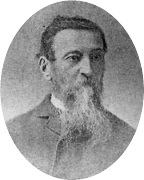 Thomas Clarke Luby was born in
Dublin, Ireland on January 15, 1822.
His was the son of the Reverend
James Luby a Protestant clergyman
and a nephew of Dr. Thomas Luby a
Senior Fellow and Dean of Trinity
College in Dublin. At age 18
he graduated from Trinity and
afterwards studied law at the Temple
in London. He became an early
advocate of the National Irish cause
and went on to become a
revolutionary, scholar and author
and editor.
Thomas Clarke Luby was born in
Dublin, Ireland on January 15, 1822.
His was the son of the Reverend
James Luby a Protestant clergyman
and a nephew of Dr. Thomas Luby a
Senior Fellow and Dean of Trinity
College in Dublin. At age 18
he graduated from Trinity and
afterwards studied law at the Temple
in London. He became an early
advocate of the National Irish cause
and went on to become a
revolutionary, scholar and author
and editor.
He was a member of Daniel O'Connell Repeal Association whose aim was to repeal the 1801 Act of Union between Great Britain and Ireland. He parted company with O'Connell after the repeal campaign failed, having come to the realization that force was the only way to achieve a meaningful measure of freedom for Ireland.
He joined the Young Ireland movement and, together with James Fintan Lalor and John O'Leary organized the 1849 Young Ireland Rising at Cappoquin, Co. Waterford. When the Rising failed he was imprisoned in Dublin from where he escaped to Australia.
He was also a contributor to the weekly newspaper The Nation founded in 1842 by Charles Gavan Duffy, Thomas Osborne Davis and John Blake Dillon.
In March of 1858, Luby, together with James Stephens, James Denieffe, Garrett O'Shaughnessy and Peter Langan founded the Irish Republican Brotherhood (IRB) in a timber yard in Dublin with the avowed purpose of overthrowing British rule in Ireland and establishing an Irish Republic. Members of the organization were known as "Fenians", named after the legendary Irish warriors called the Fianna. Luby and Denieffe traveled the country organizing military groups called 'circles'. Mainstream support came from the peasantry who, despite their poverty, were highly idealistic and patriotic. At the time of the 1867 rising the membership of the IRB was estimated at over 80,000.
In October of the same year John O’Mahony, Michael Doheny, James Roche, Thomas J. Kelly, Oliver Byrne, Patrick O’Rourke, and Captain Michael Corcoran, all of whom were committed to Irish freedom, met in Doheny's law offices in New York to organize a sister movement of the Irish Republican Brotherhood. Its objective was to rally Irish-Americans (especially Civil War veterans, north or south) behind a revolution in Ireland against British rule.
The Fenian movement quickly attracted thousands of young supporters both in Ireland and America. This influx was largely contributed to the death of Terence Bellew MacManus, a leader and hero of the Young Ireland uprising of 1848, who had died in San Francisco. In keeping with his wishes his body was shipped from San Francisco to Ireland for burial. His enormous funeral procession across the United States to New York, then through Cork and Dublin showed how widespread was the sympathy for the Young Ireland ideals which Fenianism now embodied.
In 1863 Luby came to the United States to formalize the relationship between the Fenian movement in Ireland led by James Stephens and himself and the American Fenians led by John O'Mahony. As a result of that visit the American branch was subordinated to the Irish or home branch and remained so for the remainder of its existence.
In September of 1865 the British arrested several Fenian leaders including staff members of the organization's newspaper the Irish People founded by John Stephens in 1863. The staff members arrested included Luby, John O'Leary, and Jeremiah O'Donovan Rossa. Luby, together with the others, was charged with Treason-Felony and sentenced to twenty years of imprisonment.
After serving five years of his sentence in England, first in Pentonville and later in Portland, Luby was released in the British government's general amnesty of 1871. Behind the "generosity" of the English was heavy pressure by the U.S. government to free the American Fenians including scores of former U.S. Army and several Confederate Army personnel, among them several generals and colonels. The U.S. government intervention was the result of Fenian pressure, primarily in letters from John Savage to president Ulysses S. Grant and a vote on January 30, 1871 in the US House of Representatives Resolution, 172 to 21. President Grant later hosted a number of released Fenians, including Luby, at the White House on February 22, 1871.
After his release in 1871, Luby went first to the European continent and afterwards came to America and settled in New York where he became active in Clann na Gael and the Irish Confederation, raising funds and promoting the cause of Irish freedom. He went on to become a respected journalist, lecturer and author. In 1872, he published the Life of Daniel O'Connell. In 1878 he published the Life and Times of Illustrious and Representative Irishmen. and in 1893 co-authored The Story of Ireland's Struggles for Self-Government with F. Walsh and Jeremiah C. Curtin.
He passed away on December 1, 1901 at his home in Oak Street in Jersey City, NJ.
Contributed by; Tomás Ó Coısdealbha
cemetery AND grave location
Name: Bayview Cemetery
ADDRESS: 321 Garfield Ave, Jersey City, NJ 07305
HEADSTONE
Photo supplied by John Hallanan
The above headstone was cleaned by John Burns of the Burns Brothers Monument Company
at the request of the Rev. Mychal Judge Division of the AOH also located in Jersey City.

